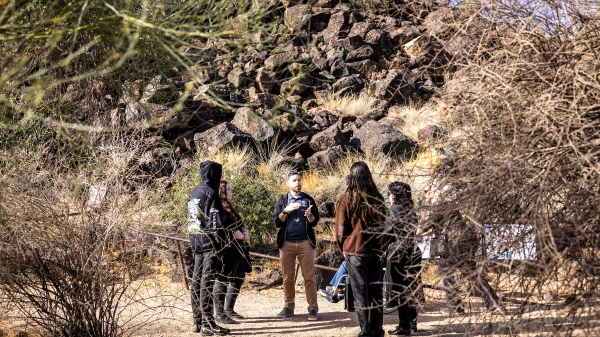ASU film professor part of 'Cyberpunk' exhibit at Academy Museum in LA
Alex Rivera's 2008 film "Sleep Dealer," an exploration of technology and borders, is featured in the new "Cyberpunk" exhibit at the Academy Museum of Motion Pictures in Los Angeles. Image courtesy of Alex Rivera
Arizona State University filmmaker Alex Rivera sees cyberpunk as a perfect vehicle to represent the Latino experience.
Cyberpunk is a subgenre of science fiction that explores the intersection of technology and humanity.
“The idea of virtual reality, the idea of living in a suspended place, can illuminate the mental condition of new immigrants, who are very much connected to the place they leave behind, but in a new world and torn between north and south,” said Rivera, who is an associate professor at The Sidney Poitier New American Film School at ASU.
Even the term “alien,” classic in science fiction, is applied directly to immigrants, he said.
“Or the image of the robot as the perfect worker who takes orders and never complains. That image can speak to the experience of undocumented immigrant who works in the United States and yet is not formally recognized.
“There's a lot of resonance between the image system of science fiction, cyberpunk and Latino reality.”
Rivera’s cyberpunk film "Sleep Dealer," released in 2008, was selected to be part of the new exhibit titled "Cyberpunk: Envisioning Possible Futures Through Cinema" at the Academy Museum of Motion PicturesThe museum, which opened in 2021, is part of the Academy of Motion Picture Arts and Sciences, which awards the Oscars. in Los Angeles. The exhibit includes props from his film and will include a full screening of “Sleep Dealer” on Feb. 3.
Rivera also wrote the voice-over narrative that museum visitors hear as they experience the exhibit.
When the curators asked him to write the voice-over in the first person, he reviewed the themes they selected, including urban decay, nuclear apocalypse, the body and machines.
“It’s a very unusual gallery film because it's psychological and personal. It's meant to take the audience through an imagined history of this genre, which wrestles with questions of technology and society,” he said.
“So the voice-over begins, ‘I was born in the cobalt mines of Congo.’”
Rivera said the timing of the "Cyberpunk" exhibit is perfect.
“This past year or two, so many of us, from every walk of life, are dealing with this onslaught of radical new technologies, primarily artificial intelligence. But we're also starting to see robots rolling around our streets,” he said.
“Themes like virtual reality, AI, robots — these are themes that we're living with today but that cyberpunk has been wrestling with for 40 years.”
And he's pleased that the exhibit has a multicultural view.
“It would've been very easy to feature ‘The Matrix,’ ‘Blade Runner’ and ‘Terminator’ and be done with it. But the curators also looked at ‘Neptune Frost,’ an Afrofuturist film; ‘Night Raiders,’ an Indigenous Canadian saga; and my film ‘Sleep Dealer,’ set on the U.S.-Mexico border.
“It’s important because it’s the actual true history of the genre. We're all part of its history. And also the future belongs to all of us. We're all going there together,” said Rivera, who co-founded the recently launched Borderlands Studios at the ASU California Center in Los Angeles.
Though it was released 16 years ago, “Sleep Dealer” continues to be frequently screened, most recently at the Brooklyn Academy of Music.
“’Sleep Dealer’ is set in the near future and it imagines a world where the border is sealed. And instead of migrating north in this future world, workers in the Global South, in places like Mexico, connect their bodies to a kind of internet to control robots that do their labor in the North," Rivera said.
“And so they're in this imagined world, where immigrants’ labor enters the United States while their bodies stay out. It’s a kind of science fictional meditation on the problems of a world connected by technology but divided by borders.”
It also reflects the current state, he said.
“We have more than 10 million undocumented folks living in this country who work, who create value through their labor, and yet who are also thought to not exist, or who shouldn't exist, or who should disappear,” he said.
“This state of being and ‘unbeing’ is a deep part of the 21st-century experience of migration.”
Rivera said that when he made “Sleep Dealer,” he never imagined it would have a large audience.
“I was shocked when the academy called, and not only did they want to screen the film as part of this history of cyberpunk, but they wanted to send curators to my house to go through the closet and find the props of the film and exhibit the props in the gallery next to props from ‘Tron’ and ‘Blade Runner.’
“And so it was all stunning and a wonderful and deep honor for me.”
More Arts, humanities and education

Petroglyph preserve celebrates 30th anniversary with ancient, modern tales
The Deer Valley Petroglyph Preserve provides a beautiful walk through a pristine desert where chuckwalla lizards are as plentiful as the cacti that comes in many shapes and sizes.It’s also a step…

Kaleidoscope short film contest inspires powerful binational filmmaking in its second year
“We come to this country not to steal anybody’s jobs but to take advantage of the opportunities that the rest ignore. We’ve been taking care of the American soil for many years. But our hands will…

ASU's Neal Lester reflects on life, death of poet Nikki Giovanni
When Neal Lester heard on Monday that poet and activist Nikki Giovanni had died, the news hit hard.Lester, the founding director of Arizona State University’s Project Humanities and a Foundation…